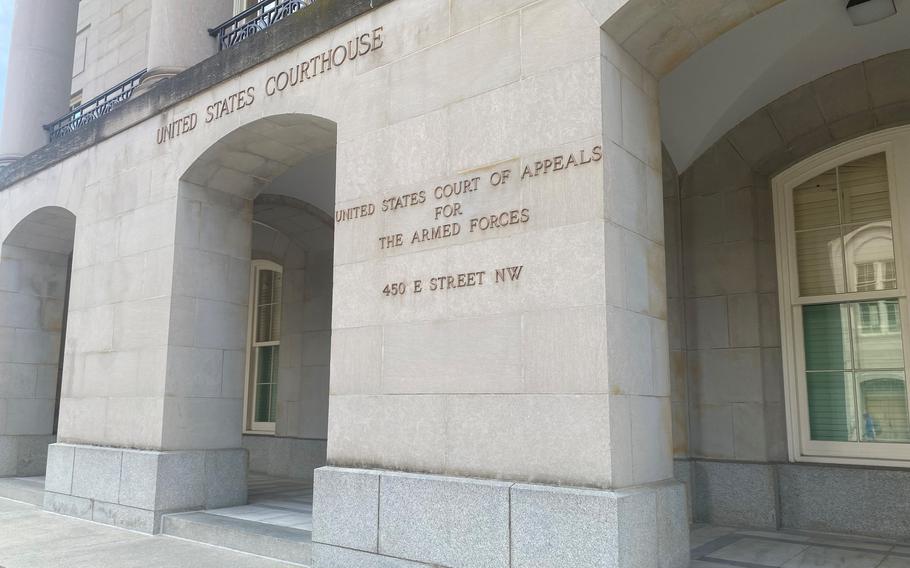
The U.S. Court of Appeals for the Armed Forces in Washington, D.C. (Robert H. Reid/Stars and Stripes)
WASHINGTON — A top military appellate court has upheld the death sentence given to a former Army officer who killed more than a dozen people in a mass shooting 14 years ago at one of the largest bases in the country.
Army Maj. Nidal Hasan on Nov. 5, 2009, walked into the Soldier Readiness Processing Center at Fort Hood, now Fort Cavazos, Texas, where troops receive medical treatment before and after deployments, and opened fire with a semi-automatic handgun. Hasan, a psychiatrist, killed 13 people and wounded dozens more by the time police arrived and subdued him.
Hasan, who was 39 at the time of the killings, was convicted by a military jury at a court-martial in 2013 and sentenced to death. He’s on death row at Fort Leavenworth, Kan., but all his appeals must be exhausted before he can be put to death.
Earlier this month, the U.S. Court of Appeals for the Armed Forces affirmed the death sentence for Hasan, rejecting various claims the gunman has raised, including he wasn’t given a fair trial and he was forcibly shaved while in custody. Hasan, now 53, was paralyzed when police shot him during the killing spree, and he is confined to a wheelchair.
“After carefully considering his raised issues and the record, we conclude that [Hasan] is not entitled to any relief,” the court stated in its 118-page decision. “We therefore affirm the [death sentence from] the lower court.”
The U.S. Court of Appeals for the Armed Forces is the military’s highest appellate court and has worldwide jurisdiction over matters involving active-duty military personnel and others who are subject to the Uniform Code of Military Justice.
This is an undated photo of Nidal Hasan, the Army psychiatrist sentenced to death for the 2009 Fort Hood shooting rampage that left 13 people dead. (Bell County Sheriff’s Department)
Hasan has raised nearly a dozen complaints in his appeals. One of them is the military court erred in allowing him to represent himself at his court-martial. He also claimed he was punished in custody in violation of the Constitution. As a Muslim, Hasan said it is his religious right to keep a beard, so when the military forced him to shave, it violated the Eighth Amendment, which bars “cruel and unusual punishment.”
“In light of the absence of any evidence to support [his] assertions that he was forcibly shaved, [he] is not entitled to relief,” the court said of that complaint.
Hasan also complained he was not allowed to plead guilty, which is something he said might have persuaded jurors not to give him the death penalty. Under the Uniform Code of Military Justice, a defendant is not allowed to plead guilty to any crime that might bring the death penalty. He also argued he was denied a right to counsel after his court-martial, and he didn’t receive a fair trial because the military proceedings were closed to public spectators.
Hasan said previously that his shooting attack at the base was retribution for the U.S. war in Afghanistan. He also said Afghanistan was “the innocent victim of an unlawful attack by the United States military” and American troops were “fair game” for the Taliban.
Though the appellate court denied Hasan’s claims, it is possible he could still avoid the death penalty. He can attempt to petition the U.S. Supreme Court to intervene in his appeal, and the president must approve any military execution. President Joe Biden has said he opposes capital punishment.
The military hasn’t executed a service member in more than 60 years. The last military member to be put to death was Army Pvt. John A. Bennett, who was hanged in 1961 for raping and trying to kill an 11-year-old girl in Austria.
Former President George W. Bush approved the military execution of Army Pvt. Ronald Gray in 2008, but he is still pursuing appeals. In 2018, the Supreme Court for the second time declined to hear a petition from Gray, who killed four people in several months in 1986 and 1987. Also on death row are former Army Sgt. Hasan Akbar, who killed two officers and wounded 14 in Kuwait in 2003, and Timothy Hennis, an Army master sergeant who raped and killed a woman in 1985 near Fort Bragg, now Fort Liberty, N.C. He also killed her young daughters, who were 5 and 3 years old.